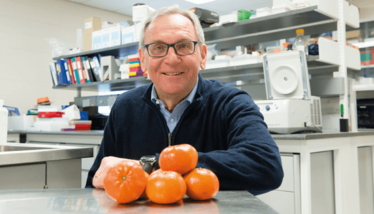An Orange a Day...
Researchers dig into the potential anti-obesity properties of a molecule found in tangerines

This article is part of our special focus on "traditional" pharma: The Small Molecule Manufacturer (read more here). You can find more articles from The Small Manufacturer here.

Nobiletin, a citrus flavonoid found in sweet oranges and tangerines, has been shown to reduce obesity in mice – and potentially lessen associated complications, such as heart disease and diabetes. Mice who were fed with a high-fat, high-cholesterol diet supplemented with nobiletin weighed less than those who hadn’t ingested the small molecule according to research published by scientists at Western University (Canada) (1).
“Obesity and its resulting metabolic syndromes are a huge burden to healthcare systems, and we have very few interventions that have been shown to work effectively. This warrants the pursuit of novel therapeutic interventions,” Murray Huff, a professor at Western’s Schulich School of Medicine & Dentistry, said in a statement (2). “Nobiletin helps in the regression of atherosclerosis (the buildup of plaque in arteries), but although the positive effects of the molecule have been observed, we’re still not entirely sure how it works.”
Huff and his team predicted that the molecule was “likely acting on AMP kinase”, a regulator that determines how the body is able to manage fat by activating the cellular machinery that enables energy to be expended. But when they began to study mice who lacked AMP kinase, nobiletin was still able to elicit an anti-obesity effect. “Though nobiletin’s mechanism of action remains a mystery, our findings suggest that the molecule won’t interfere with other drugs that act on AMP kinases like metformin, a first-line medication for the treatment of type 2 diabetes,” Huff added. The next step for the Canadian researchers will be human trials.
- MW Huff et al, “The citrus flavonoid nobiletin confers protection from metabolic dysregulation in high-fat-fed mice independent of AMPK”, The Journal of Lipid Research, 61, 387, (2020).
- Western University, "Molecule found in oranges could reduce obesity and prevent heart disease and diabetes" (2020). Available at https://bit.ly/2RZNna9
After finishing my degree, I envisioned a career in science communications. However, life took an unexpected turn and I ended up teaching abroad. Though the experience was amazing and I learned a great deal from it, I jumped at the opportunity to work for Texere. I'm excited to see where this new journey takes me!



















